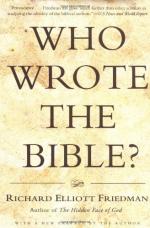
|
| Name: _________________________ | Period: ___________________ |
This test consists of 15 multiple choice questions and 5 short answer questions.
Multiple Choice Questions
1. Why does Friedman conclude that P was written during King Hezekiah's reign?
(a) the fact that P puts its emphasis on centralized religion.
(b) the fact that P favors dispersed sacrificial centers.
(c) the fact that P dates himself in his writing.
(d) the fact that P reveres the Mosiac priesthood.
2. What was so attractive about Wellhausen's summary?
(a) it placed Author P at the right place in the right time.
(b) it placed a priestly source in a priestly period.
(c) it drew distinctions between fact and fiction.
(d) it was conclusive in its finding.
3. With what did Ezra return to Judah?
(a) a new revelation from God.
(b) a blueprint of the Temple.
(c) a copy of the Torah that is in modern usage.
(d) an army of 10,000 men.
4. How does Friedman see Julius Wellhausen's summary of the second Temple theory for Author P?
(a) it was logical but ignored major evidence.
(b) it did not hold together logically.
(c) it was logical, coherent, persuasive--and wrong.
(d) it was illogical, poorly put together, and confusing.
5. Why does Friedman hold early Biblical scholars in high esteem?
(a) they made their judgements from English translations.
(b) they studied ancient languages.
(c) what they had done correctly outweighs their mistakes.
(d) they got everything right about the authors of the Bible.
6. From where did some of the inclusions into the Pentateuch come?
(a) the apocrypha.
(b) the Book of Generations.
(c) the Book of the Dead.
(d) the Davidic traditions.
7. To determine if insertions have been made in a text, two or more of what elements must be present?
(a) wording, grammar, syntax, theme, and literary structure.
(b) vocabulary, annotated references, and historical context.
(c) cross references, credentials, and clear writing style.
(d) dates, times, proper names, and subject matter.
8. Why does Baruch Halpern eliminate the possibility that a king had written Deuteronomy?
(a) it has the language of common people.
(b) it vows there will never be a king in Israel.
(c) it has restrictions a king would not put upon himself.
(d) it lacks the authority of a king.
9. What happened to the Davidic covenant after the invasion of the Babylonians?
(a) the Temple is rebuilt and a Davidic king is put in charge.
(b) God had to be reminded of his promise to David.
(c) a descendant of David is made governor of Judah.
(d) the king is no longer on the throne and the Temple is burned.
10. What is the guilt of the Jews that led them into exile?
(a) stopping all sacrifices.
(b) worshipping foreign gods.
(c) sacrificing in the wrong places.
(d) eating forbidden foods.
11. What does Friedman conclude about the Tabernacle after the first Temple was built?
(a) that the it actually existed inside the Holy of Holies.
(b) that it was used to cover the Temple.
(c) that it was burned to prevent idolatry.
(d) that it was set up behind the Temple.
12. What had most early scholars scholars considered that J and E had come from?
(a) right after settling in the land of Canaan.
(b) during the time of King David.
(c) around the time of the death of Moses.
(d) in the time of the two kingdoms, Israel and Judah.
13. What is the third part assumption of the pious fraud?
(a) that religion was still being conceived.
(b) that religion was centralized.
(c) that religion was exclusive to Judah.
(d) that religion was uniform in two kingdoms.
14. From where does Friedman speculate the laws came from in the writings of Author P?
(a) they were likely points everyone agreed on.
(b) they likely arose from other texts.
(c) they were likely oral traditions.
(d) they likely came from Divine revelation.
15. How did J's and E's texts probably originate?
(a) in scholarly studies.
(b) as literal translations.
(c) from writings of Moses.
(d) in oral tradition.
Short Answer Questions
1. What occurred during the reign of King Hezekiah?
2. According to Friedman's theory, when does that place Author P in time?
3. What is in Deuteronomy to set up the possibility of the fall of Judah?
4. How were books written at the time of the Pentateuch authors?
5. What does Friedman suggest gives a clue as to the identity of the writer D?
|
This section contains 759 words (approx. 3 pages at 300 words per page) |

|




